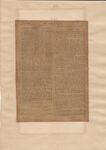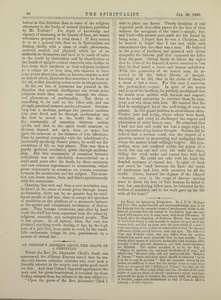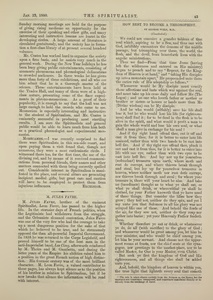HPB-SB-10-239: Difference between revisions
No edit summary |
mNo edit summary |
||
| (One intermediate revision by the same user not shown) | |||
| Line 11: | Line 11: | ||
| item =1 | | item =1 | ||
| type = article | | type = article | ||
| status = | | status = proofread | ||
| continues = | | continues = | ||
| author = | | author = | ||
| Line 17: | Line 17: | ||
| subtitle = | | subtitle = | ||
| untitled = | | untitled = | ||
| source title =Spiritualist | | source title = London Spiritualist | ||
| source details = | | source details = No. 388, January 30, 1880, p. 50 | ||
| publication date =1880-01- | | publication date = 1880-01-30 | ||
| original date = | | original date = | ||
| notes = | | notes = | ||
| Line 25: | Line 25: | ||
}} | }} | ||
... | {{Style S-Small capitals| When}} the Rev. Dr. Alexander Clark’s death was announced, the ''Albany Express ''stated that he was the only known orthodox minister who ever took a friendly interest in the sceptic and spoke good words for him. And that Colonel Ingersoll appreciated the man and his great-heartedness, is revealed by these feeling extracts from his tribute to the late editor:— | ||
“Upon the grave of the Rev. Alexander Clark I wish to place one flower. Utterly destitute of cold dogmatic pride that often passes for the love of God, without the arrogance of the ‘elect’—simple, free, and kind—this earnest man made me his friend by being mine. I forgot that he was a Christian, and he seemed to forget that I was not, while each remembered that the other was a man. He believed in the power of kindness, and spanned with divine sympathy the hideous gulf that separated the fallen from, the pure. Giving freely to others the rights that he claimed for himself, it never occurred to him that his God hated a brave and honest unbeliever. With the generosity of an honest man, he accorded to all the fullest liberty of thought, knowing, as he did, that in the realm of thought a chain is but a curse. For this man I entertain the profoundest respect. In spite of the taunts and jeers of his brethren, he publicly proclaimed that he would treat infidels with fairness and respect; that he would endeavour to convince them by argument and win them with love. He insisted that the God he worshipped loved the well-being of even an atheist. In this grand position he stood almost alone. Tender, just, and loving, where others were harsh, vindictive, and cruel, he challenged the respect and admiration of every honest man. He admitted that I had not lost and could not lose a single right by the expression of my honest thought. Neither did he believe that a servant could win the respect of a generous master by persecuting and maligning those whom the master would willingly forgive. His sympathyes were not confined within the prison of a creed, but ran out and over the walls like vines, hiding the cruel rocks and rusted bars with leaf and flower. He could not echo with his heart the fiendish sentence of eternal fire. In spite of book and creed, he ‘read between the lines’ the words of tenderness and love, with promises for all the world. Above, beyond the dogmas of the Church—humane even to the verge of heresy—causing some to doubt his love of God because he failed to hate his unbelieving fellow men, he laboured for the welfare of mankind, and to his work gave up his life with all his heart.” | |||
{{HPB-SB-item | {{HPB-SB-item | ||
| Line 32: | Line 34: | ||
| item =2 | | item =2 | ||
| type = article | | type = article | ||
| status = | | status = proofread | ||
| continues = | | continues = 240, 241 | ||
| author =Wild, George | | author =Wild, George | ||
| title =How Best to Become a Theosophist | | title =How Best to Become a Theosophist | ||
| subtitle = | | subtitle = | ||
| untitled = | | untitled = | ||
| source title =Spiritualist | | source title = London Spiritualist | ||
| source details = | | source details = No. 387, January 23, 1880, pp. 43-5 | ||
| publication date =1880-01-23 | | publication date = 1880-01-23 | ||
| original date = | | original date = | ||
| notes = | | notes = | ||
| Line 46: | Line 48: | ||
}} | }} | ||
... | <center>By George Wyld, M.D.</center> | ||
<center>''(Concluded.)''</center> | |||
We could not conceive a grander tableau of that soul which, aspiring to be a Son, and thus one with God, infallibly encounters the demons of the middle passage, but triumphing over these, the world, the flesh, and the devil, from henceforth lives with the angelic ministrations. | |||
Thus we find—From that time Jesus (having left the wilderness and entered on His ministry) began to preach and to say “Repent, for the Kingdom of Heaven is at hand,” and “taking His disciples up into a mountain apart,” He propounded unto them the entire rule of His adeptship as follows.* | |||
Whosoever would be My disciple must crucify those affections and lusts which war against the soul, and must take up his cross daily and follow Me (The Logos); and no one who loveth father or mother or brother or sisters or houses or lands more than Me (Divine wisdom) can be My disciple. | |||
And he who would (selfishly) save his life shall lose it, but he who would lose his life (for righteousness) shall find it; for to be dead in the flesh is to be alive in the spirit, and what would it profit a man to gain the whole world and lose his own soul, or what'' ''shall a man give in exchange for his soul? | |||
And if thy right hand offend thee, cut it off and I cast it from thee, for it is better to enter into life maimed, rather than with two hands to be cast into hell fire. And if thy right eye offend thee, pluck it out and cast it from thee, for it is better to enter into life with one eye, rather than with two eyes to be cast into hell fire. And lay not up for yourselves (redundant) treasures upon earth, where moth and rust do corrupt, and where thieves break through and steal, but lay up for yourselves treasures in heaven, where neither moth nor rust doth corrupt, nor thieves break through and steal; for where your treasure is, there will your heart be also. And take no (inordinate) thought as to what ye shall eat, or what ye shall drink, or wherewithal ye shall be clothed, for your Father knoweth that ye have need of these things. But consider the lilies how they grow; they toil not, neither do they spin, and yet I say unto you that Solomon in all his glory was not arrayed like one of these. And behold the fowls of the air, for they sow not, neither do they reap nor gather into barns; yet your Heavenly Father feedeth them. | |||
Whether therefore ye eat or drink, or whatsoever ye do, do all (with sacrifice) to the glory of God; and whosoever would be great among you, let him be your minister, and who would be chief among you, let him be your servant. And choose not the uppermost rooms at feasts, nor the chief seats at the synagogue, nor greetings in the market-place, nor to be called Master, for One is your Master, even Christ. | |||
But seek ye first the kingdom of God and His righteousness, and all things else shall be added unto you. | |||
And, behold, the kingdom of heaven is within you, the true light that lighteth every soul that cometh {{Style S-HPB SB. Continues on|10-240}} | |||
{{Footnotes start}} | |||
<nowiki>*</nowiki> The rule is taken almost entirely from the Sermon on the Mount, but the sentences are sometimes transposed, and sometimes cumulated directly or indirectly from the teachings oi Jesus. | |||
{{Footnotes end}} | |||
{{HPB-SB-footer-footnotes}} | {{HPB-SB-footer-footnotes}} | ||
{{HPB-SB-footer-sources}} | |||
<gallery widths=300px heights=300px> | |||
london_spiritualist_n.388_1880-01-30.pdf|page=4|London Spiritualist, No. 388, January 30, 1880, p. 50 | |||
london_spiritualist_n.387_1880-01-23.pdf|page=9|London Spiritualist, No. 387, January 23, 1880, pp. 43-5 | |||
</gallery> | |||
Latest revision as of 16:07, 18 September 2024
An Atheist's Address Above the Grave of Christian
When the Rev. Dr. Alexander Clark’s death was announced, the Albany Express stated that he was the only known orthodox minister who ever took a friendly interest in the sceptic and spoke good words for him. And that Colonel Ingersoll appreciated the man and his great-heartedness, is revealed by these feeling extracts from his tribute to the late editor:—
“Upon the grave of the Rev. Alexander Clark I wish to place one flower. Utterly destitute of cold dogmatic pride that often passes for the love of God, without the arrogance of the ‘elect’—simple, free, and kind—this earnest man made me his friend by being mine. I forgot that he was a Christian, and he seemed to forget that I was not, while each remembered that the other was a man. He believed in the power of kindness, and spanned with divine sympathy the hideous gulf that separated the fallen from, the pure. Giving freely to others the rights that he claimed for himself, it never occurred to him that his God hated a brave and honest unbeliever. With the generosity of an honest man, he accorded to all the fullest liberty of thought, knowing, as he did, that in the realm of thought a chain is but a curse. For this man I entertain the profoundest respect. In spite of the taunts and jeers of his brethren, he publicly proclaimed that he would treat infidels with fairness and respect; that he would endeavour to convince them by argument and win them with love. He insisted that the God he worshipped loved the well-being of even an atheist. In this grand position he stood almost alone. Tender, just, and loving, where others were harsh, vindictive, and cruel, he challenged the respect and admiration of every honest man. He admitted that I had not lost and could not lose a single right by the expression of my honest thought. Neither did he believe that a servant could win the respect of a generous master by persecuting and maligning those whom the master would willingly forgive. His sympathyes were not confined within the prison of a creed, but ran out and over the walls like vines, hiding the cruel rocks and rusted bars with leaf and flower. He could not echo with his heart the fiendish sentence of eternal fire. In spite of book and creed, he ‘read between the lines’ the words of tenderness and love, with promises for all the world. Above, beyond the dogmas of the Church—humane even to the verge of heresy—causing some to doubt his love of God because he failed to hate his unbelieving fellow men, he laboured for the welfare of mankind, and to his work gave up his life with all his heart.”
How Best to Become a Theosophist
We could not conceive a grander tableau of that soul which, aspiring to be a Son, and thus one with God, infallibly encounters the demons of the middle passage, but triumphing over these, the world, the flesh, and the devil, from henceforth lives with the angelic ministrations.
Thus we find—From that time Jesus (having left the wilderness and entered on His ministry) began to preach and to say “Repent, for the Kingdom of Heaven is at hand,” and “taking His disciples up into a mountain apart,” He propounded unto them the entire rule of His adeptship as follows.*
Whosoever would be My disciple must crucify those affections and lusts which war against the soul, and must take up his cross daily and follow Me (The Logos); and no one who loveth father or mother or brother or sisters or houses or lands more than Me (Divine wisdom) can be My disciple.
And he who would (selfishly) save his life shall lose it, but he who would lose his life (for righteousness) shall find it; for to be dead in the flesh is to be alive in the spirit, and what would it profit a man to gain the whole world and lose his own soul, or what shall a man give in exchange for his soul?
And if thy right hand offend thee, cut it off and I cast it from thee, for it is better to enter into life maimed, rather than with two hands to be cast into hell fire. And if thy right eye offend thee, pluck it out and cast it from thee, for it is better to enter into life with one eye, rather than with two eyes to be cast into hell fire. And lay not up for yourselves (redundant) treasures upon earth, where moth and rust do corrupt, and where thieves break through and steal, but lay up for yourselves treasures in heaven, where neither moth nor rust doth corrupt, nor thieves break through and steal; for where your treasure is, there will your heart be also. And take no (inordinate) thought as to what ye shall eat, or what ye shall drink, or wherewithal ye shall be clothed, for your Father knoweth that ye have need of these things. But consider the lilies how they grow; they toil not, neither do they spin, and yet I say unto you that Solomon in all his glory was not arrayed like one of these. And behold the fowls of the air, for they sow not, neither do they reap nor gather into barns; yet your Heavenly Father feedeth them.
Whether therefore ye eat or drink, or whatsoever ye do, do all (with sacrifice) to the glory of God; and whosoever would be great among you, let him be your minister, and who would be chief among you, let him be your servant. And choose not the uppermost rooms at feasts, nor the chief seats at the synagogue, nor greetings in the market-place, nor to be called Master, for One is your Master, even Christ.
But seek ye first the kingdom of God and His righteousness, and all things else shall be added unto you.
And, behold, the kingdom of heaven is within you, the true light that lighteth every soul that cometh <... continues on page 10-240 >
* The rule is taken almost entirely from the Sermon on the Mount, but the sentences are sometimes transposed, and sometimes cumulated directly or indirectly from the teachings oi Jesus.
Editor's notes
Sources
-
London Spiritualist, No. 388, January 30, 1880, p. 50
-
London Spiritualist, No. 387, January 23, 1880, pp. 43-5


